
In 2018, at the peak of the construction and integration of the Egina FPSO, over 3,000 Nigerians were employed by Samsung (SHI-MCI).
The challenge was that most of these employees had no industry qualifications or experience before starting work on the project.
Samsung chose to meet this challenge head-on not by mobilising employees from overseas but instead investing 560,000 manhours of training programs with one goal in mind: to identify future Nigerian talent who could participate in the historic completion of the Egina FPSO.
This transformation resulted in thousands of Nigerians eventually joining Samsung team to form the core of Samsung’s first heavy industries operation on the African continent.
When Godwin Oghenegueke was hired as a cleaner of Samsung’s welding floor in 2014, he never expected that he would have a chance to be one of the first beneficiaries of Samsung’s free-of-charge welding training course.
“I started by watching over the shoulders of the students grinding, welding and coating. Seeing this, the Korean instructors invited me to help them with small tasks. Even though it was a small thing, having seen my commitment and hard work, they invited me to train with them. They said ‘ok let this guy to learn to weld.’” He is now an internationally-certified welder, permanently hired by Samsung as a professional welder.
Godwin’s instructor remembers how Godwin watched intently and enthusiastically over the shoulders of the first batch of trainees. Goanghun Kim, a senior trainer at Samsung’s Welding Qualification Center (WQC) noted that, “passion” and “enthusiasm to learn and improve” are the most valued attributes they seek in Samsung’s future team members.
“There was lot of resistance amongst existing trainees. They saw him as beneath them. We told those students that background is not important. As long as you are devoted in developing your skills, that’s what matters to us.”
Creating equal opportunities and instilling an inclusive work culture enabled Samsung to break record after record. Motivated by trust and without the constraints of societal prejudice, Samsung’s Nigerian trainees and employees were propelled to keep pushing the boundaries of industry norms; Samsung can proudly boast a 100% pass rate in the international welder training program.
These achievements eventually led the SHI-MCI integration and fabrication yard to become one of the few companies in Africa to be awarded accreditation and training certificates by both national and international bodies including the Nigerian Federal Ministry of Labour and Employment and the International Institute of Welding.
Welding trainer Mr Goanghun Kim is very firm in saying that Samsung’s work culture and equal opportunity policy are just enablers, and the achievements are due to the more than 3,000 individuals just like Godwin who worked tirelessly.
“Nigerians should be proud and empowered by these achievements. This proves the competency and potential of Nigerian people in the international job market and will help establish Nigeria as an engineering hub to global manufacturing industries. Nigerians are ambitious and hard working. I have never seen such enthusiasm and eagerness to improve and to learn.”
Godwin’s story proves how training opportunities can be equalizers between the haves and the have-nots, and should be further harnessed and fostered in Nigeria to play its part in providing economic growth.
It also highlights the fact that many vocational courses are too expensive and are not accessible to those who need them the most. This barrier aggravates the economic and societal prosperity gap.
An international welding certificate training course similar to Godwin’s can cost on average between 2.5-2.8 million NGN per person which makes the course unaffordable for many Nigerians without extra financial support.
Godwin is one of many inspiring stories from the Egina project. “I would not have been able to afford this training without Samsung’s help. I know of many lives which improved thanks to the project. Some people came in as helpers and now they are assistant managers, scaffolders, welders, operators or riggers. I also came in as a nobody and now I can help my grandma and younger siblings.”
People like Godwin are a living testimony to many ambitious young Nigerians. “I have set an example for my friends and younger siblings. I tell them what I studied and learnt which gives them goals and hopes to fulfill.”
Godwin, who now works at Samsung as Material Controller says that what makes him happy is to have the privilege to teach others, passing on the same opportunities he received.
For this story to continue in Nigeria, more global engineering companies should follow Samsung’s example and help the government and educational sector as a part of their local content plans.
By providing opportunities, transferring skills and supporting vocational programs to those who cannot afford education, Samsung’s example will hopefully serve as a pathway for other companies to further accelerate Nigeria’s economic growth and human development.











